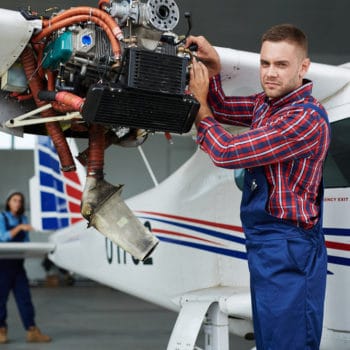Why We Love It
-
$55,400Potential Avg. Salary
-
4.2%Job Growth Rate
-
Growing DemandJob Outlook
-
Don't Take Work HomeCareer Attribute
It is the main responsibility of an airfield operations specialist to ensure that commercial and military aircrafts take-off and land safely. Taking care of the flight schedule can involve a wide range of other supportive duties as well.
Recommended Schools
What is an Airfield Operations Specialist?
Duties
The following are the type of duties you are expected to perform on a daily basis:
- Ensure a safe operating environment for all aircraft operations and personnel, in compliance with airport and Federal Aviation Administration safety regulations.
- Keep track of external factors such as weather conditions, wildlife activity and runway conditions, and report to maintenance personnel or flight crew when required.
- Be in charge of efficiently coordinating the arrival, departure, refuelling, loading and parking of aircrafts on the airfield.
- Conduct regular inspections of airport safety and operations area to eliminate potential threats for aircraft operations or maintenance.
- Maintain continuous learning with working knowledge of rules or regulations about airport and aircraft operations.
Day In The Life
Most of your responsibilities will involve closely monitoring and creating reports of all airfield facilities including fences, hangers and lighting equipment. You will perform maintenance as required. In case of emergencies or potential hazards, you will operate different motor vehicles like fire trucks, jeeps, dump trucks, sweeping machines and pickup trucks.
Taking stock of equipment and ensuring that flights are undisturbed at all times is vital for this role. To function effectively, you will spend time building a good relationship with air traffic control, civil engineers and maintenance personnel, keeping point-to-point radio contact for safe take-off or landing of both commercial and military aircraft as needed.
On a weekly or monthly basis, additional responsibilities include coordinating any changes to flight itineraries to the relevant air traffic control officials, tracking military flight plans with the required civilian agencies and finally, providing support when there are aircraft or medical emergencies.
Work Schedule And Typical Hours
You will be working at control centers and outdoors, so a high comfort level with fumes, bad weather, loud noises and dangerous machinery is essential for success. Work is typically done in shifts at 40 hours per week, often running into late nights, weekends and holidays. Since airfields are open throughout the year and production demands vary, there will be occasions where you are working overtime to maintain operations.
Growth Of The Job
The US Bureau of Labor Statistics predicts a job growth of 4% between 2014-2024, which is slower than the national average. Overall new job openings are projected at 3500 due to new opportunities and the need for replacements. In this type of career, you can advance to higher roles such as material-moving machine supervisor, air traffic controller, freight conductor, operations manager and logistics manager.
Typical Employers
You can find work in numerous industries associated with commercial and military air transportation, including scheduled and non-scheduled air transportation, the state and local government, the US Department of Defense, federal executive branch transportation, aerospace product or parts production and other air transportation support.
Some names of employers looking to hire airfield operations specialists are the City of Boise, Lexicon Inc., Indianapolis Airport Authority, Airforce Reserve, Hillsborough County Aviation Authority, US Army Corps of Engineers (USACE) and PAE Government Services.
Recommended Schools
How To Become an Airfield Operations Specialist
Most positions related to airfield operations provide detailed on-the-job training and require you to possess at least a high school diploma at the entry-level. However, at least 60% of specialists eventually obtain higher academic credentials to advance their careers. Graduate degree programs in aviation management and technology have courses on weather, airport management and aircraft systems that orient you with role expectations.
There are many educational institutions such as universities, community colleges and technical schools that provide certificates or degrees associated with aviation. You can jumpstart your potential in this industry by completing a certificate course in Air Traffic Control. Completing college internships or apprenticeships recognized by the US Department of Labour will also give you an advantage.
You will be a good match for this career path if you like taking control of large scale projects and leading people to make timely decisions. For aviation safety and control, taking risks and dealing with various stakeholders requires superior communication skills and the ability to think on your feet. Writing progress reports, reading weather charts and entering data on computer software is a frequent task, so good technology skills regarding accounting, databases, spreadsheets and email is valuable.
Airfield Operations Specialist Salary Data
We’ve provided you the following to learn more about this career. The salary and growth data on this page comes from recently published Bureau of Labor Statistics data while the recommendations and editorial content are based on our research.
National Anual Salary
Low Range
$35,880Average
$55,400High Range
$95,330National Hourly Wage
Low Range
$17/hrAverage
$27/hrHigh Range
$46/hrHow do Airfield Operations Specialist salaries stack up to other jobs across the country? Based on the latest jobs data nationwide, Airfield Operations Specialist's can make an average annual salary of $55,400, or $27 per hour. This makes it an Above Average Salary. On the lower end, they can make $35,880 or $17 per hour, perhaps when just starting out or based on the state you live in.
Salary Rankings And Facts
#321 Nationally for All Careers
Programs and Degrees
Here are the most common degrees for becoming an Airfield Operations Specialist. a is usually recommended and specifically a degree or coursework that prepares you for the particular field, see below.
Highest Education Among Airfield Operations Specialists
- 0.3% Doctorate
- 4.5% Masters
- 32.2% Bachelors
- 16.2% Associates
- 33.4% College
- 13.2% High School
- 0.3% Less than High School
Job Growth Projections and Forecast
2014 Total Jobs
7,2002024 Est. Jobs
7,500Job Growth Rate
4.2%Est. New Jobs
300How does Airfield Operations Specialist job growth stack up to other jobs across the country? By 2024, there will be a change of 300 jobs for a total of 7,500 people employed in the career nationwide. This is a 4.2% change in growth over the next ten years, giving the career a growth rate nationwide of Below Average.
Growth Rankings And Facts
#476 Nationally for All Careers
What Companies Employ The Most Airfield Operations Specialists
| Industry | Current Jobs | New Jobs Needed | % Increase |
|---|---|---|---|
| Local government, excluding education and hospitals | 1,900 | 100 | 0% |
| Scheduled air transportation | 1,600 | -100 | --- |
| Support activities for air transportation | 1,400 | 100 | 0% |




















